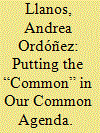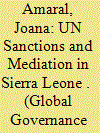|
|
|
Sort Order |
|
|
|
Items / Page
|
|
|
|
|
|
|
| Srl | Item |
| 1 |
ID:
185680


|
|
|
|
|
| Summary/Abstract |
Sanctions and mediation are often applied simultaneously by the UN, but there has been little systematic exploration of their interrelationships. Drawing on research from the Sanctions and Mediation Project (SMP), both complications and complementarities can be identified. Sanctions can complicate mediation by fostering exclusion, emboldening nonsanctioned parties, closing mediation space, undercutting mediator impartiality, and forcing premature agreements. At the same time, sanctions can complement mediation by deterring spoilers, breaking stalemates, incentivizing cooperation, modifying cost-benefit calculations, ensuring broad participation in talks, and facilitating the onset of talks. The conditions under which complementarity can be enhanced include UN Security Council unity, focus and coherence of mandates, and regional cooperation. This article concludes with policy recommendations for different institutional actors and some suggestions for future research.
|
|
|
|
|
|
|
|
|
|
|
|
|
|
|
|
| 2 |
ID:
185679


|
|
|
|
|
| Summary/Abstract |
Gender equality has long been a goal within the UN system, particularly for women’s representation among the professional staff. Yet it was more an aspiration than the target of serious action, let alone with leadership from the UN Secretary-General. It could not be addressed, however, without adequate data revealing women’s absences. Building a dataset based on Human Resources Statistics Reports has enabled the authors to show the patterns in the UN Secretariat and the secretariats of eighteen agencies, funds, and programs. The analysis reveals persistent gender-specific conceptualizations of issue areas as more masculine (e.g., peace, security, finance, trade) or feminine (health, human rights, population), creating “glass walls” and “glass ceilings” that have limited women’s appointments to high-level positions in certain areas. The results reveal the limits of goal setting, the slowness of change, and the difference that leadership from the UN Secretary-General can make in the UN’s “long march” toward gender equality.
|
|
|
|
|
|
|
|
|
|
|
|
|
|
|
|
| 3 |
ID:
185678


|
|
|
| 4 |
ID:
185681


|
|
|
|
|
| Summary/Abstract |
While sanctions and mediation are often used to address the same conflict situations, they are usually employed without significant coordination. Focusing on a rare case of a mediator successfully wielding the threat of sanctions, this article explores the utility of sanctions for mediation in the Yemeni political transition during the mandate of UN special adviser Jamal Benomar. Although the transition ultimately derailed, the analysis shows that the threat of sanctions can be used in different phases of the mediation process to provide mediators with the leverage needed to convince conflict parties to engage in negotiations, break stalemates during talks, nudge parties toward an agreement, or persuade potential spoilers to refrain from undermining the implementation of the negotiated agreement. Their success, however, not only depends on the degree of convergence between the application of the two instruments, but also on the type of target, regional support, and institutional backing.
|
|
|
|
|
|
|
|
|
|
|
|
|
|
|
|
| 5 |
ID:
185684


|
|
|
|
|
| Summary/Abstract |
The UN-imposed sanctions on Sierra Leone began in 1997 after the Revolutionary United Front (RUF) led a coup that forced newly elected president Ahmad Tejan Kabbah into exile. Alongside its peacemaking efforts, the UN Security Council explicitly supported the reinstatement of Kabbah, and its sanctions targeted the RUF by limiting travel and banning the trade of arms, petroleum, and diamonds. This article analyzes whether and how UN sanctions pushed the RUF to negotiate, accept, and implement agreements mediated by the Economic Community of West African States and the UN. Its findings are drawn from the qualitative analysis of official documents, memoirs, and interviews with key negotiators. It adds to the inclusion debate in peace mediation literature by discussing whether the coordinated use of sanctions and mediation can resolve the difficulties inherent in including veto players in peace negotiations.
|
|
|
|
|
|
|
|
|
|
|
|
|
|
|
|
| 6 |
ID:
185683


|
|
|
|
|
| Summary/Abstract |
This article analyzes the role of UN sanctions in the context of peace negotiations in South Sudan from the outbreak of the civil war in December 2013 until the signing of the peace agreement in August 2015. Drawing on the literature regarding third-party intervention in civil wars, it explores whether the UN sanctions regime—established in March 2015—was conceived as an instrument of leverage to get the parties to agree to a settlement. The article asks two questions: Have sanctions and mediation been coordinated? Has the interlink between sanctions and mediation been successful? First, there has been little coordination between sanctions and mediation. Second, UN sanctions did not appear to play a crucial role in the mediation process. This analysis is based on desk research and nineteen interviews with officials from the UN, the Intergovernmental Authority on Development, and other regional actors conducted between 2017 and 2018.
|
|
|
|
|
|
|
|
|
|
|
|
|
|
|
|
| 7 |
ID:
185682


|
|
|
|
|
| Summary/Abstract |
The UN frequently employs sanctions on the same conflicts where it attempts mediation. While both efforts carry a UN stamp, they follow different political logics that are not always coherent with each other: sanctions are enacted by the UN Security Council, while mediation is led by a special representative/envoy of the UN Secretary-General, often on the basis of a Security Council mandate. This article explores two UN interventions in Libya that combined mediation with mandatory sanctions: the conflict leading to the overthrow of the Muammar Qaddafi regime (2011) and the civil war that ensued when the country was split between the first elected parliament and its successor (2014–2015). The Libyan case illustrates that the coherence of mediation and sanctions ultimately depends on the UN Security Council unity of purpose.
|
|
|
|
|
|
|
|
|
|
|
|
|
|
|
|
|
|
|
|
|